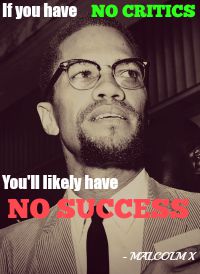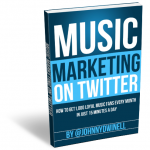Music critiques sting when they aren’t positive. For me, I always put a lot of weight on critiques, especially from respected music business people and even some not so respected failed musician turned journalist/critics.
You should put weight on critiques from your music business “eldersâ€, but how much?
Here’s the thing, just because they outrank you in a MAJOR way doesn’t mean they’re right or aware of your situation, your goals, or intentions. It doesn’t mean they foresee the future and all the planets that will align to propel you as an artist.
Just because they have massive power and a Godlike reputation doesn’t mean they are right about your song or sound. They are definitely unaware of your aims with that song, aren’t they?
Just because they say something that hurts doesn’t mean you should ignore them either, especially if you disregard their opinion simply because it is negative.
I get it, it’s a human reaction to get defensive, but let’s be productive and find the meaning or value, if any exists.
You have to process the information correctly and no matter what, there are going to be dots that have to be connected by YOU simply because you have all the information on your career trajectory after the criticism is rendered.
If you are an artist on the cutting edge, with something real, something unique, something that isn’t derivative, then you should EXPECT that people won’t get what you’re doing. Trust me, you’ll be eating criticism for breakfast.
You have to understand the system, the market, what people’s motives are when deciding how deep you’re going to let those words cut.
You always have to consider the source.
What is their perspective?
For instance, if you asked a culinary icon who happens to be a vegan to evaluate your prized meatloaf dish should you be upset about a scathing review?
Where is the reviewer coming from?
What, exactly, is your situation? What are you trying to accomplish? Are you an indie artist who just wants to find an audience or do you dream of being a major label international superstar?
The answers to these questions will dictate a multitude of different pragmatic strategies.
Therefore, if a critic crafts a scathing review based on how you music will never be mainstream, and your intention is to be underground, no  harm, no foul, right? Similar to a sports car critic evaluating a minivan and poo-pooing it because it won’t take 90 degree corners at 100 mph. Duh.
harm, no foul, right? Similar to a sports car critic evaluating a minivan and poo-pooing it because it won’t take 90 degree corners at 100 mph. Duh.
As an artist, looking back, I took a lot of reviews a little too seriously and unfortunately, that led to me ignoring all of them moving forward, which was a mistake.
The appropriate way to process the feedback from a review, good or bad, is to consider the source, apply the information to your circumstances, assess your situation OBJECTIVELY, and then file the review in the appropriate mental folder.
Huh?
Here is an example.
If you aspire to be a professional songwriter (as opposed to an artist) then you are beholden to the market trends. Period.
In other words, YOU HAVE TO STUDY THE MARKET.
If you want to be professional, you will need to sell some songs, right?
If you want to make money you are going to have to sell what the market wants right now.
Nobody cares about a genius, avant-garde, gourmet hamburger stand in a vegan community. They don’t eat meat. You won’t make money regardless of how good the product is.
So if I apply some of the regular rants I hear from aspiring songwriters who don’t get it to our vegan community analogy, it would sound something like this, “Screw those guys man, I make the greatest burgers ever, I just have to find the right person who gets my burgers to help launch my brand.â€
How silly and completely detached from reality does that sound?
They’re barking up the wrong tree to begin with!
They have created the very roadblock that is getting them so upset.
If you want to sell your songs ASAP they better be written in the vein of what you hear on the radio right now, regardless of your opinion towards the current market trends.
If you want to be super artsy with your songs, and you are not a performer, than you will have to find a super artsy artist to bring those songs to life. You could change the world in that scenario because you have moved your hamburger stand OUT of the vegan community and into a more appropriate market.
With songwriters, often a combo platter is more accurate. I know TONS of professional hit songwriters who blow my mind with their talent. They are professional because they understand the art side of the business and the market. They write the crap you hear on the radio (and sometimes hate it) to keep relevant, keep their relationships up, oh, and to pay their mortgages. However, they also write their hearts as well, however, they understand that, right now, those songs are not going to be received as well from the major music market professionals simply because the pros can’t do anything with them at the moment.
Trends change.
I’ll bet Dairy Queen and Baskin-Robbins sell a lot more ice cream in the summer than they do in the winter in the northern part of America.
In country music, a real good example of this is with ballads at the moment. In the 1990’s the radio waves were full of balladeers like Collin Raye whose body of work was amazing, slow, rangy love songs. Today, for whatever reason, ballads are just not on the radio so song pluggers,  publishing companies, producers, record label execs, etc., don’t want to waste time listening to your ballad because they can’t sell it.
publishing companies, producers, record label execs, etc., don’t want to waste time listening to your ballad because they can’t sell it.
That doesn’t mean your song sucks.
It means they can’t use it, right now so they don’t waste their precious time.
Ballads will make a comeback, but not right now. So you process the information not as a rejection but understand that PARTICULAR song isn’t going to make anyone any money right now, even if it’s a knock-down-drag-out-HIT.
Get it?
When I was in high school, our bass player’s father was a killer mechanic for the big earth mover trucks and machines. Of course, like Spicoli’s dad from Fast Times at Ridgemont High, he had the ultimate set of tools.
I remember our bass player bought a used Japanese car. When he proudly presented the car, his father gave the automobile a scathing review. His father hated it. Here’s the key, he didn’t hate it so much because it was a foreign car (although that was PART of the disdain). He mostly hated the car because it was built using metric nuts and bolts. Therefore he didn’t own 1 tool that could be used to help his son.
Make sense?
You may have a relationship with a professional who would like to help you but you keep buying foreign cars so their American tools are useless and they can’t help you.
If you’re an artist who aspires to expand your brand and get a major label record deal, you need to understand the dynamic of today’s music industry to avoid putting too much weight to a rejection.
It used to be that a major label found a real talented artist, believed in them, signed them, developed them, and then released the first record to start their career.
That just doesn’t happen anymore.
So if your goal is to create a demo and shop that to get your deal, you are selling screen doors to a submarine manufacturer; bad plan.
Today, the review or rejection has as much to do with your music as it does with the business you’ve created behind the music.
If you are seriously viewed by the professionals as “the next big thing†based on your talent alone, the best you can hope for is they want to keep an eye on you. They’re human, if they like you they don’t want anyone else to get you but they can’t really work with you and help you, using their system, until you create a serious buzz in the market place.
an eye on you. They’re human, if they like you they don’t want anyone else to get you but they can’t really work with you and help you, using their system, until you create a serious buzz in the market place.
Some of you have probably experienced an advanced step of this dynamic. You actually got signed by a label, management, booking agency, producer, etc. because you’re good and they want to make sure they solidify their relationship in case you blow up. The reality is that these signings don’t mean squat in the market place. If you aren’t building your brand and increasing your market share you end up with a huge, untapped opportunity because you aren’t bringing enough to the table.
Consider the source, and intelligently separate the wheat from the chaff.
Here’s a real world example. The people surrounding the Allman Brothers Band developed my band when I was an artist. This gave us an immense amount of access to one of the most incredible, iconic rock bands of all time.
I was sitting next to Gregg Allman in his hotel room one night and he was listening to our demo tape. Gregg had his hand wrapped around the back of my neck in a sort of choke hold, I imagine, to ensure he had my attention (how could he not?). He then proffered his (appropriate) critique and said we were “Too busy†especially during the verses. He said, “The band has to come DOWN!†as he SMACKED his two hands together, “during the verses, bra, we need to hear you sing! There ain’t enough space, man.â€
He was right, you know, but all I was thinking about was this dude had a band with 52 inputs of drums alone and he’s calling us “busy�
Well, there is a good example of how NOT to think. We were too “busy†on that recording. We eventually got it and took his advice, but if I had listened rather than bowing up right away, I might’ve got it a little sooner.
Listen to all the critiques.
Consider the source.
And do it better next time.
They’re just critiques.
Stay
In
Tune
PS: If you haven’t already downloaded my free Music Marketing On Twitter book, please enjoy it on me. Go to GiftFromJohnny.com put  in your name and tell us where to send it. It’ll teach you how to get 1,000 new targeted followers every month for just 15 minutes per day.
If you like this post, please SHARE it and/or LEAVE A COMMENT thank you!
[ois skin=”Bottom Post”]









